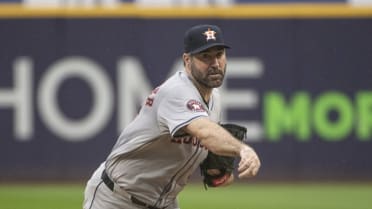Called on earlier than expected, Zerpa excels in victory
KANSAS CITY -- The Astros' lineup can be daunting at any given point, one through nine, so when Angel Zerpa had two runners on base in the sixth inning Friday night, the Royals teetered on the edge.
But Zerpa struck out José Abreu looking on a full-count changeup and then got Michael Brantley to ground out, ending the frame and keeping the Royals’ lead intact for what eventually was a 4-2 win over the American League West leaders at Kauffman Stadium.
The sequence in the sixth was important not only for the Royals’ win, but also for Zerpa’s development. He began the inning wildly, and the Astros tagged him for a run on Yordan Alvarez’s RBI double. Then Zerpa walked Kyle Tucker, and that was followed by a mound visit from pitching coach Brian Sweeney, who urged Zerpa to attack the zone.
When he had trouble commanding his fastball to Abreu, Zerpa went to his slider -- the focal point of his work this season -- which Abreu fouled off.
Abreu wasn’t expecting a changeup on the seventh pitch of the at-bat, and Zerpa located it perfectly at the bottom of the zone.
“To get both of those guys out to end the inning was probably the key point in the game,” manager Matt Quatraro said.
A key takeaway from the Royals beating an Astros team that can’t be counted out as World Series contenders was that the win was paced by the pitching.
Homers from Nelson Velázquez, Bobby Witt Jr. -- putting him one away from becoming the first Royal to achieve a 30-homer, 30-stolen base season -- and Michael Massey helped the Royals grab and keep the lead.
But the pitching limiting the Astros to two runs on seven hits was massive, especially when Royals starter Zack Greinke only made it two innings. Greinke essentially served as an opener for Zerpa. The 39-year-old threw two scoreless innings but worked hard, needing 48 pitches (28 for strikes).
“We’re really going to listen to him and see how he feels,” Quatraro said. “... The pitch count got up quickly, and we know that when he tacks on pitches in one particular inning, it takes a lot out of him.”
Greinke, finishing up his 20th big league season, is expected to be in the 50-70 pitch range in his last couple outings of 2023. While it puts a strain on the bullpen, it also opens up innings for pitchers like Zerpa, who figures to play a role in the future.
“I haven’t been super sharp,” Greinke said. “I’m getting older. I do [feel fine], but I get tired faster than ideal. … I would have liked to throw more [innings], but it didn’t go smoothly. It would have been nicer to take it easier on [Zerpa] today, because it was a tough lineup for him. But I wasn’t real sharp. I had to do what was best, and he did a great job.”
Zerpa was a different look for the Astros. The 23-year-old lefty throws 94-96 mph and has an improving slider with a changeup. He allowed one run on two hits in four innings with five strikeouts and one walk.
After beginning the season on the injured list, Zerpa has made his way back to the Majors in the second half. He allowed 19 runs (18 earned) on 28 hits in 23 innings in eight appearances in August, but now he’s showing why he might be counted on in 2024. In September, he’s allowed just two runs on nine hits in nine innings (four appearances).
“The approach is to go out there and try to help the team,” Zerpa said. “Hopefully, I’ve done that.”
Zerpa has appeared in a variety of roles, from starting to long/bulk outings to one-inning relief. His slider has steadily improved this season, getting more swing-and-misses each month he’s been in the big leagues.
On Friday, the Astros swung 10 times on the pitch and whiffed four times.
“I thought he had good two-seam, four-seam fastballs,” Astros second baseman Jose Altuve said. “Good slider. He executed with good location. You have to give some credit to him.”
If anything, a sinker-slider combination sets Zerpa up well for a bullpen role if he’s not turned into a full starter next season.
“I think he can do any number of things,” Quatraro said. “We’ve seen him hold his velocity pretty well when he has been stretched out – he was [94-95 mph] most of the night -- and the more innings he gets to pitch, the more he’s going to be able to develop his pitches. Ideally, he’s building himself up to get enough innings so we can consider him a starter.”
Anne Rogers covers the Royals for MLB.com.




